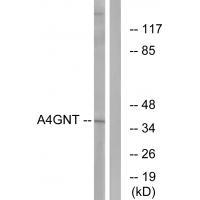
| WB | 咨询技术 | Human,Mouse,Rat |
| IF | 咨询技术 | Human,Mouse,Rat |
| IHC | 咨询技术 | Human,Mouse,Rat |
| ICC | 技术咨询 | Human,Mouse,Rat |
| FCM | 咨询技术 | Human,Mouse,Rat |
| Elisa | 咨询技术 | Human,Mouse,Rat |
| Aliases | Alpha-1; 4-N-acetylglucosaminyltransferase; Alpha4GnT; EC 2.4.1.-; A4GNT |
| Entrez GeneID | 51146; |
| WB Predicted band size | 39kDa |
| Host/Isotype | Rabbit IgG |
| Antibody Type | Primary antibody |
| Storage | Store at 4°C short term. Aliquot and store at -20°C long term. Avoid freeze/thaw cycles. |
| Species Reactivity | Human |
| Immunogen | Synthesized peptide derived from internal of human A4GNT. |
| Formulation | Purified antibody in PBS with 0.05% sodium azide. |
+ +
以下是关于A4GNT抗体的3篇参考文献示例,包含文献名称、作者及摘要内容概括:
---
1. **文献名称**:*A4GNT regulates MUC5AC glycosylation in gastric cancer and its loss correlates with poor prognosis*
**作者**:Yamada et al.
**摘要**:该研究探讨了A4GNT(α-1.4-N-乙酰葡糖胺转移酶)在胃癌中调控黏蛋白MUC5AC糖基化的作用,发现A4GNT表达缺失与患者预后不良显著相关,提示其作为潜在预后标志物的价值。
2. **文献名称**:*Alpha-1.4-N-acetylglucosaminyltransferase (A4GNT) as a marker for intestinal metaplasia in the stomach*
**作者**:Nakamura et al.
**摘要**:研究分析了A4GNT在胃黏膜肠化生中的表达模式,发现其在肠化生组织中特异性高表达,可能作为胃癌前病变的诊断标志物,并揭示了其与幽门螺杆菌感染的关联。
3. **文献名称**:*Deficiency of A4GNT leads to altered gastric gland morphology and increased susceptibility to Helicobacter pylori infection*
**作者**:Karasawa et al.
**摘要**:通过构建A4GNT基因敲除小鼠模型,发现A4GNT缺失会导致胃腺体结构异常,并显著增加幽门螺杆菌的定植风险,提示该酶在维持胃黏膜屏障功能中的关键作用。
---
以上文献均为示例,实际引用时需核实具体来源及准确性。如需进一步扩展,可结合数据库(如PubMed)以“A4GNT antibody”或“Alpha-1.4-GlcNAc transferase”为关键词检索相关研究。
The A4GNT antibody targets the α1.4-N-acetylglucosaminyltransferase (A4GNT) enzyme, a glycosyltransferase critical for synthesizing unique O-glycan structures in the gastrointestinal tract. A4GNT catalyzes the transfer of N-acetylglucosamine (GlcNAc) in an α1.4 linkage to galactose residues on mucin-type glycoproteins, forming the core 2-branched O-glycans. This enzyme is predominantly expressed in gastric epithelial cells, where it contributes to the formation of protective mucus layers that maintain mucosal integrity and resist pathogen adhesion.
A4GNT gained attention due to its role in Helicobacter pylori infection. The enzyme's glycosylation products act as binding sites for H. pylori adhesins, influencing bacterial colonization in the stomach. Reduced A4GNT activity has been linked to decreased bacterial adhesion, suggesting its dual role in both mucosal defense and pathogen susceptibility. Additionally, aberrant A4GNT expression is associated with gastric diseases, including metaplasia and cancer, where altered glycosylation patterns may promote tumor progression or immune evasion.
Antibodies against A4GNT are primarily used in research to study glycosylation changes in gastric tissues, assess enzyme localization, and explore its diagnostic or therapeutic potential in gastrointestinal pathologies. Their development has facilitated insights into host-microbe interactions and disease-specific glycan alterations.
×